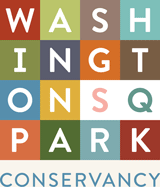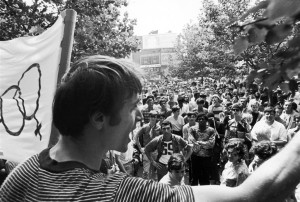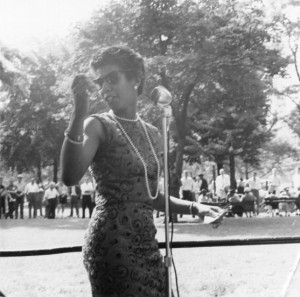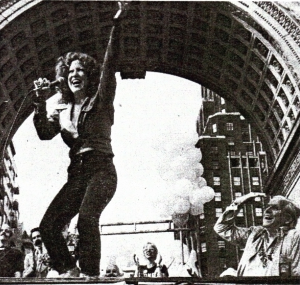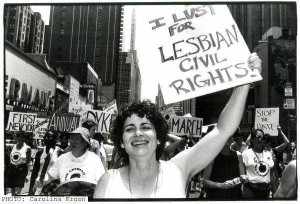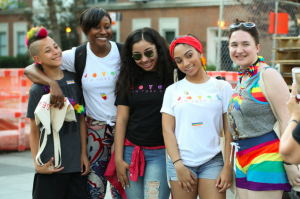Washington Square Park’s Pride
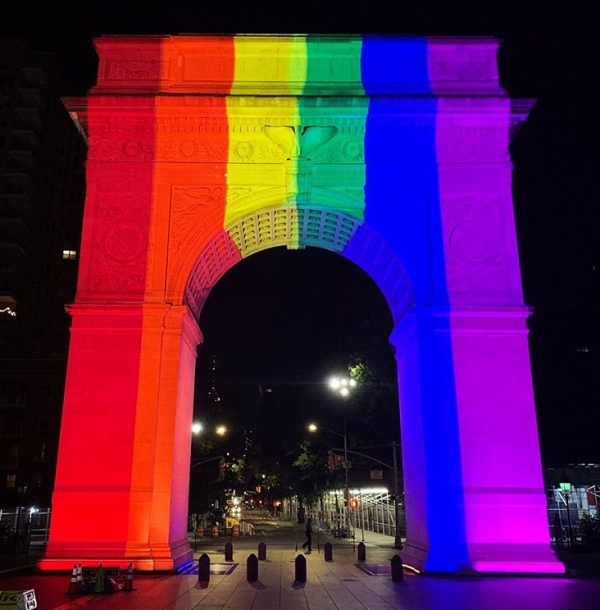
In June of 1969, the Stonewall Riots at nearby Christopher Park sparked the modern LGBT rights movement in the United States. Since then, NYC has honored June as LGBT Pride Month.
From the earliest stirrings of activism, Washington Square Park has been a place for LGBT+ activists to organize, rally, and protest, and we’re proud to help carry that legacy forward. Together we dance, we create, and we remember. We remember those who came before us and those who will forge the path into the future. As we celebrate Pride 2023, we’re taking a look back at some of the highlights of WSP’s LGBT+ history.
STONEWALL RIOTS AFTERMATH
One month after the Stonewall Riots, LGBT activists Marty Robinson and Martha Shelley addressed a crowd in Christopher Park. Just across from Stonewall Inn, over 500 people came out to show their support and listen to Robinson and Shelley speak, capping off a rally that began in Washington Square Park to protest the police’s actions at Stonewall.
LORRAINE HANSBERRY
Whether she was living at 337 Bleecker Street or the home on Waverly Place that A Raisin in the Sun helped purchase in 1960, Lorriane Hansberry was a Greenwich Village fixture. She was a voracious activist; lending her voice to racial equality and LGBT rights. She was wrote letters to monthly national lesbian publication The Ladder and spoke out in Washington Square Park; Hansberry used her voice to try and make the world a better place, with special care for those who were on the fringes of society.
THIRD PRIDE PARADE
The Third Pride Parade in 1973 began in Central Park and ended with a massive rally at Washington Square Park. Thousands of people gathered to raucously advocate for LGBT rights. Entertainers like Barry Manilow and Bette Midler lent their voices to the cause, literally.
DYKE MARCH
In 1993, the first Dyke March was organized to demonstrate lesbian rights and visibility. It is a tradition that continues to this day. The Saturday before the Pride March, thousands of people march from Bryant Park to Washington Square Park, exercising their First Amendment right to protest the inequality that lesbians face in our communities.
MARRIAGE EQUALITY
Edie Windsor and Thea Spyer first met at a restaurant only a few blocks from Washington Square Park in 1963, although it wasn’t until a few years later that their romantic relationship began. Shortly after becoming engaged, Edie and Thea moved into an apartment at 2 Fifth Avenue. Lifelong advocates for LGBTQIA+ rights, Edie and Thea made history when a grieving Edie tried to assert her financial rights as Thea’s widow. In 2013 the Supreme Court Case United States v Windsor, overturned the Defense of Marriage Act, finally recognizing the right of all Americans to marry who they love.
On June 20th, 2023, on what would have been Edie’s 94th Birthday, a crowd gathered for the official unveiling of Edie Windsor and Thea Spyer Way, the newly co-named street on the North side of the Park.
LOOKING FORWARD
Throughout its history Washington Square Park has been home to protests, celebrations, and rallies for LGBT+ rights. That tradition continues to this day. In June, we always look forward to the vibrancy that Pride brings to the Park and the Village. We’re proud to work in a neighborhood that is a safe space for people from all walks of life to enjoy.
If you’d like to learn more about LGBT history in NYC, head over to the NYC LGBT Historic Sites Project.
